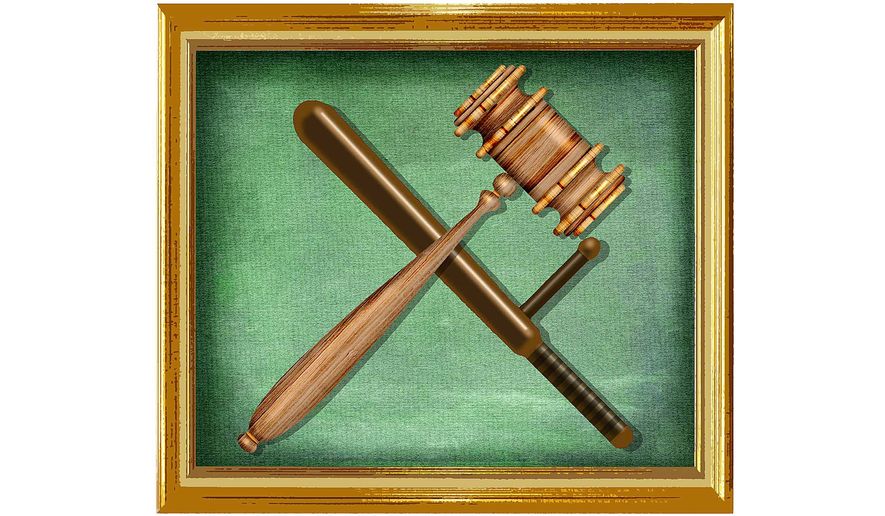OPINION:
The Racketeer Influenced and Corrupt Organizations (RICO) Act is a law adopted to fight organized crime. Yet, in recent months, a chorus has emerged calling for a breathtaking abuse of RICO by state attorneys general and the Department of Justice against political opponents.
Specifically, lawmakers, academics and the “green” lobby demand that prosecutors use the law to extort money from legitimate businesses who oppose them, under threat of RICO investigations and prosecution. The objective is to silence political opposition, extract a vow not to support other opponents and, finally, to force companies to underwrite the global warming industry. Yes, the global warming industry.
It’s an industry that includes not only professional activists and academics but also businesses hoping to profit from peddling climate fear. They have found allies in politicians seeking to deploy the awesome weight of the federal government to investigate those blocking the industry from getting every law and policy it wants.
In a recent Senate Judiciary Committee hearing, Sen. Sheldon Whitehouse, Rhode Island Democrat, pressed Attorney General Loretta Lynch about using RICO to investigate climate change skeptics. Mr. Whitehouse specifically inquired into possible action against “the climate denial apparatus that the fossil fuel industry has erected.”
“This matter has been discussed,” replied Ms. Lynch. “We have received information about it and have referred it to the FBI to consider whether or not it meets the criteria for which we could take action on.”
Ms. Lynch’s response — specifically her use of “could” — suggests the Justice Department is looking for some way to intervene, an approach at odds with her department’s job of assessing what it “should” do. After all, investigations are costly, intrusive and even ruinous, and should be undertaken judiciously.
While RICO suits, or the threat thereof, can be costly for those at the receiving end, they can be lucrative for others. For example, we now know that the RICO chorus hopes to obtain massive settlements to fund the global warming machine’s academic and activist components.
RICO predators expect targeted companies to behave ritually: pay up under threat of years of bad press and litigation. These costs are passed on to consumers, of course. But the far greater threat is to democratic debate, given the lawsuits’ other objective, which proponents openly acknowledge: to coerce their critics into silence and extract vows not to fund further opposition.
Naturally, a group of largely taxpayer-funded academics echoed Mr. Whitehouse’s call. Known as the “RICO-20,” they sent a September letter asking Ms. Lynch to use RICO against opponents. Some members of Congress have specified two companies they want targeted: ExxonMobil and Shell.
However, the faculty lounge cheerleaders do not limit their aspirations to targeting mere oil companies. The RICO-20 co-ringleader, George Mason University’s Edward Maibach, has acknowledged that their target — those who “knowingly deceive on climate risk” — captures individual opponents, as well.
Mr. Maibach’s previous career involved running a campaign paid for by precisely the same model. So it was that he boasted, in an interview with Grist magazine, that “if a RICO suit were successful; and if there was a settlement between the government and the fossil fuel industry — there is no question in my mind that a good portion of that money should be spent on a national campaign to educate people on the risks of climate change, and build their resolve to work toward solutions.”
At George Mason, Mr. Maibach now teaches climate campaigning and runs the Center for Climate Change Communication, which studies “how to mobilize populations to adopt behaviors and support public policies that reduce greenhouse gas emissions.” Centers require funding.
Global warming is big business. As an industry, it appears far more vulnerable to credible investigation than those it seeks to haul into the dock. As a recent Wall Street Journal editorial reminded us about the global warming industry’s tactics, one prematurely sent Greenpeace press release still contained the instruction, “[Fill in alarmist and armageddonist factoid here].”
Under their own standard of “knowingly deceiving on climate risk,” the global warming alarmists seem ripe for investigations into, say, hyping climate risk for gain, at the expense of shareholders and communities that lose substantial tax and other revenues used for schools and infrastructure. We’re talking big bucks here — from $20 billion (for “renewable” and “green” energy vendors, by their own account) to $1.5 trillion in annual disbursements, all thanks to government edicts in the name of the elusive “climate crisis.”
Demanding the Justice Department employ the full might of the federal government against opponents is cowardly bullying. It also fits the commonly accepted definition of McCarthyism, “the practice of making unfair allegations or using unfair investigative techniques, especially in order to restrict dissent or political criticism.” The global warming industry ought to be ashamed. Judged by its proclaimed standard, any investigation should be of the global warming industry rather than its critics.
• Chris Horner is an attorney in Washington D.C. and senior fellow at the Competitive Enterprise Institute.




Please read our comment policy before commenting.